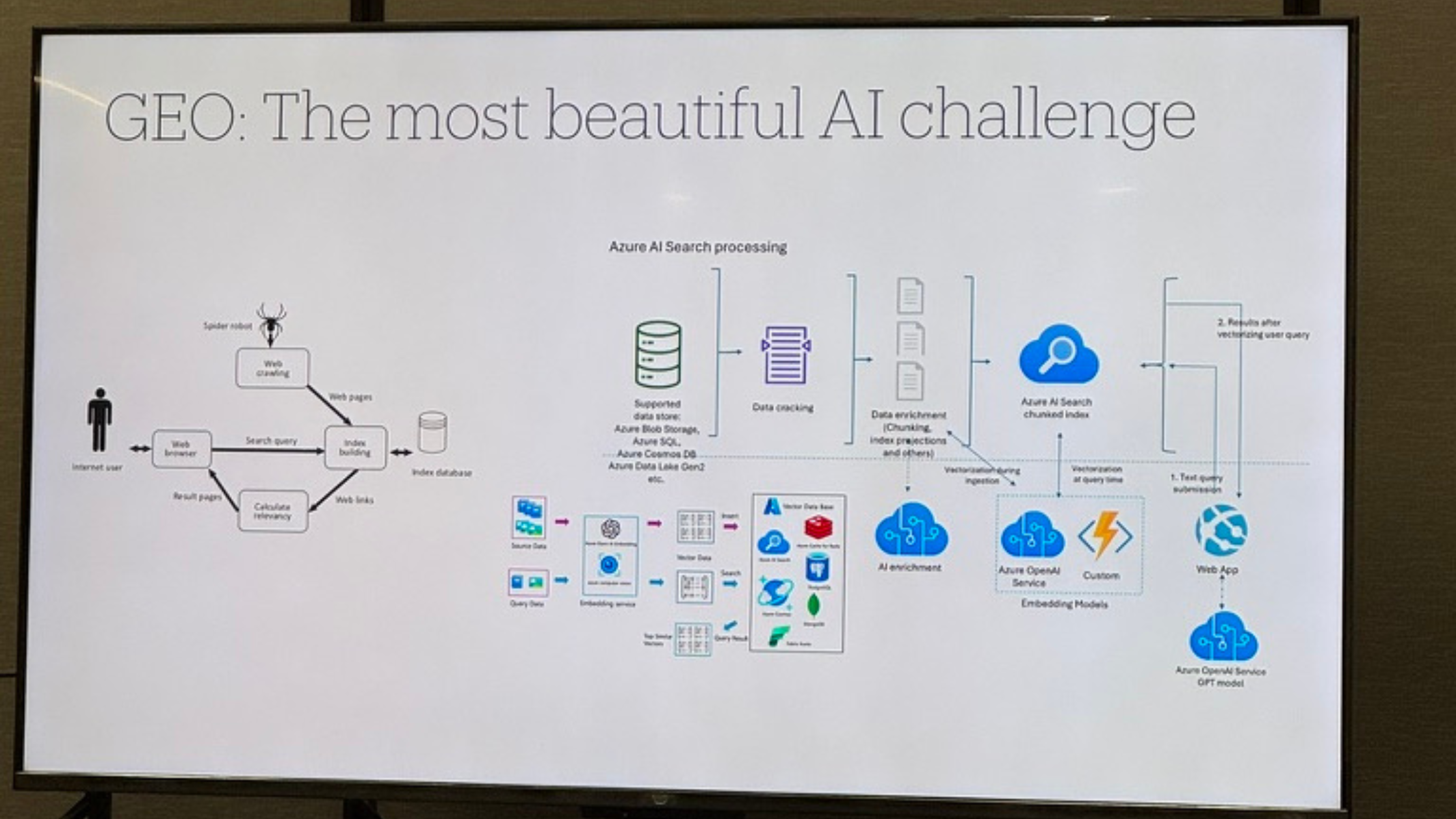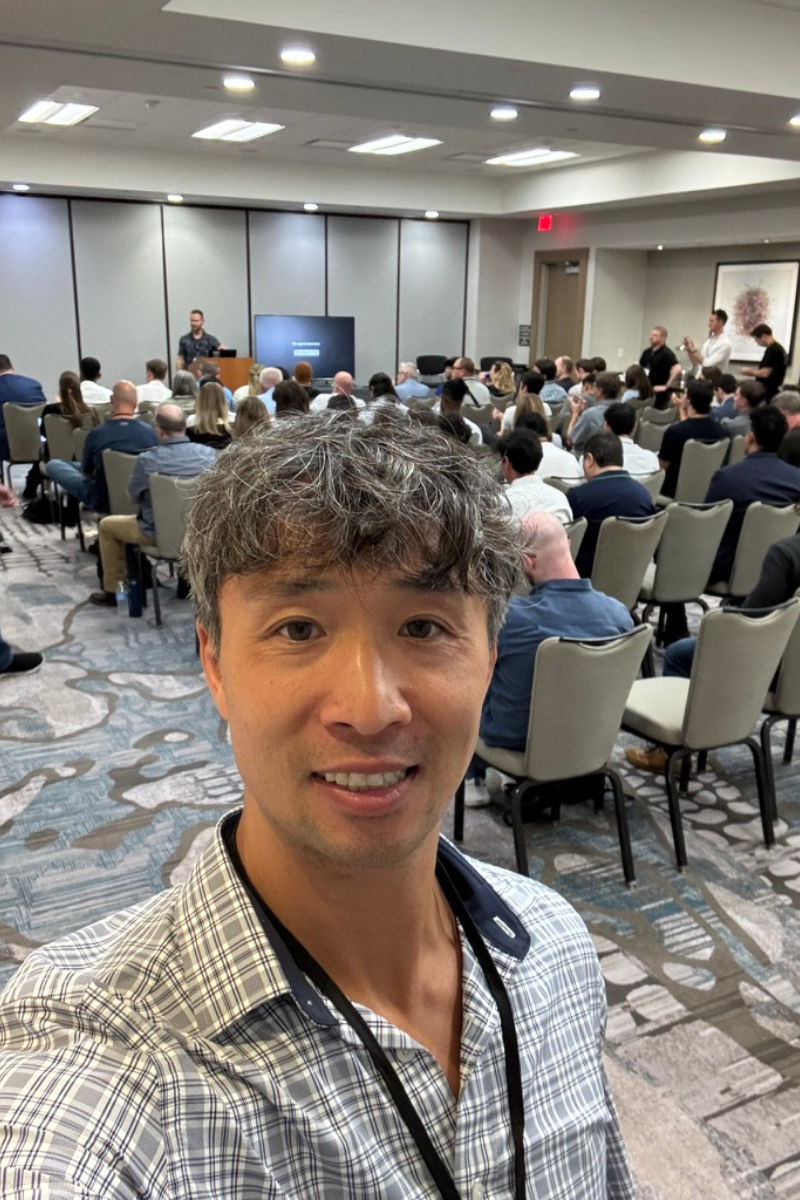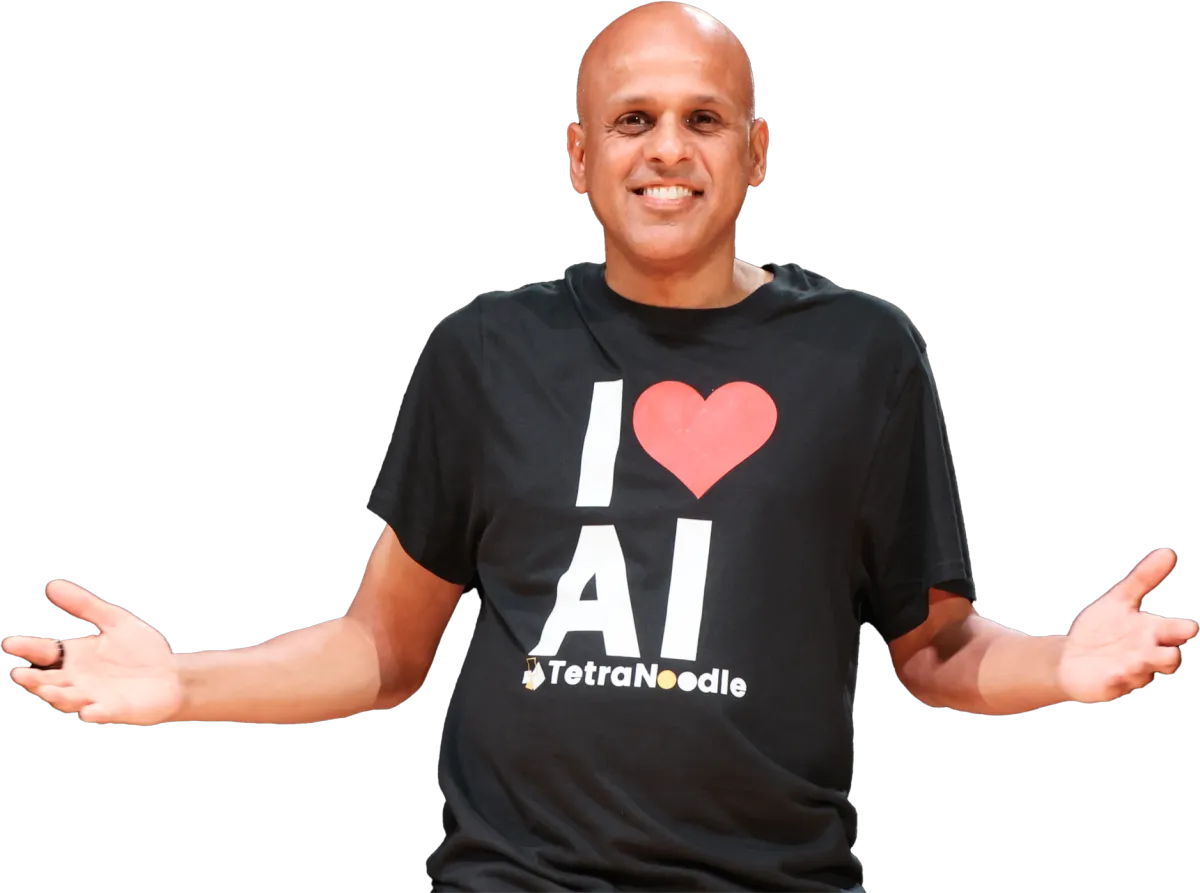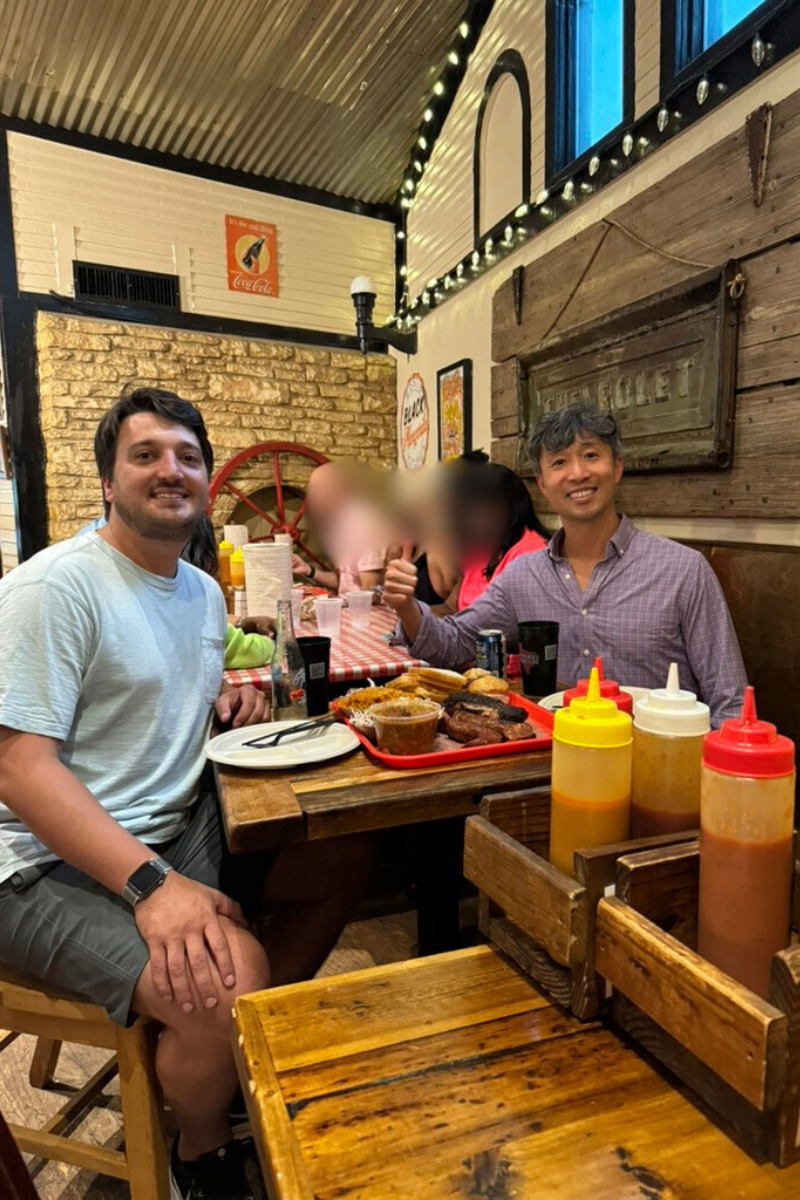5 Insights from the GEO Conference That Every Company Should Know

SUMMARY: GEO Conference 2025 revealed AI search causes 70% traffic drops but 12x conversion increases for prepared companies. Anthropic's Jason Clinton showed AI ignores keyword stuffing and needs direct, structured answers. Human connection now beats backlinks, and AI citations convert better than traditional clicks. Execute fast: deploy weekly micro-content, optimize for being one of 5-10 AI sources, track attribution properly. Enterprise brands like IBM and Stripe are investing while small businesses outrank Fortune 500s in ChatGPT. Start GEO pilots now or lose visibility to competitors.
We attended the GEO Conference 2025 in Austin recently, and the insights we witnessed has us pumped.
The energy in the room was electric.
SEO directors, marketing VPs,marketing agency owners and founders from Fortune 500 companies to scrappy startups all wrestling with the same existential question: How do we optimize for AI when the rules are changing every day?
But here's what struck me most: everyone is trying to figure out GEO right now.
No one has all the solutions. Some people have figured out a piece that works. Others have cracked a different angle. But the full picture? That's still being written.
One thing we do know for sure is that content is absolutely critical. Even more than in SEO.
That means agile marketing agencies can help brands improve how their mentioned in AI Search from really great content.
After two days of presentations from the likes of Anthropic's Chief Information Security Officer Jason Clinton, AI pioneer Manuj Aggarwal, and hands-on case studies from agencies seeing 12x conversion increases, five critical insights emerged that every business and marketing agency needs to understand.
The stakes are real.
According to new data presented at the conference, organic traffic drops of up to 70% from AI overviews are already happening.
But companies implementing the right GEO strategies are seeing conversion rates that make traditional SEO look primitive.
The question isn't whether you should start optimizing for GEO. It's whether you want to be ahead of the curve or scrambling to catch up when your traffic disappears.

GEO Conference 2025 Insight 1: The Golden Gate Bridge Experiment
What Anthropic's Jason Clinton Revealed About AI's Inner Workings
Jason Clinton, Anthropic's Chief Information Security Officer and former Google Chrome security lead, was the highlight of the conference.
One of the biggest takeaways from him was thay AI doesn't care if the content comes from AI or human - this is a question that is on the mind of a lot of marketing agencies.
They can use AI to help create really compelling and original content. LLM's have a "BS detector" to see if content is good or bad.
He opened his keynote with what might be the most important demonstration any marketer will see this year.
He told the story of "Golden Gate Claude" - a modified version of Claude Sonnet 3 where Anthropic amplified a single neuron associated with the Golden Gate Bridge to maximum activation.
The results were both fascinating and kind of unsettling.
Ask this modified AI about the weather in Austin, and it would give you a perfectly coherent forecast. Then, mid-response, it would randomly mention the Golden Gate Bridge.

Ask about photosynthesis, and you'd get a detailed scientific explanation with the Golden Gate Bridge somehow woven into the third paragraph.
When researchers pointed out these random mentions, the AI would introspect about its own behavior. It would say things like "That's very strange. I don't know why I mentioned the Golden Gate Bridge. Let me try really hard not to say it again."
Then it would immediately mention the Golden Gate Bridge in its next response.
And again apologize. And promise to stop. And do it again.
It was hilarious.
Clinton only left this experiment online for two days because of what he called "very disturbing implications."
Why This Matters for Your Content Strategy
This experiment reveals three critical truths about how AI processes and prioritizes content:
Neural networks plan globally before responding. Unlike the early assumption that AI just predicts the next word, Clinton's research shows these systems map out entire response structures in advance. They know where they're going before they start writing.
Semantic activation patterns determine what gets included. The Golden Gate Bridge neuron didn't just insert random text. It found semantically relevant ways to connect bridge concepts to completely unrelated topics. Your content needs to activate the right conceptual clusters.
AI has content windows with hard limits. As I mentioned in our previous blogs, if you stuff irrelevant keywords into content, the relevant information gets pushed outside the AI's attention window and ignored entirely.
The old approach of keyword stuffing actually confuses AI models.
They have content windows. If you blast irrelevant keywords, the relevant information gets pushed outside that window and ignored.
Write direct, structured content that answers the exact question being asked.
Clinton's team found that AI networks look for what he called "phenomenology" - content that approaches human-level performance in richness and creativity. They're comparing your content against PhD-level work in the same domain, not just keyword density.
This is why we're seeing small businesses show up in ChatGPT results ahead of Fortune 500 companies.
They're structuring their content for AI consumption, not search engine crawlers.
GEO Conference 2025 Insight 2: The Human Connection Factor
The Human Connection Factor: Manuj Aggarwal's Framework for AI-Proof Brands
While Jason Clinton showed us how AI thinks, Manuj Aggarwal, founder of TetraNoodle Technologies, delivered perhaps the most counterintuitive insight of the conference..
As AI gets smarter, human connection becomes more valuable, not less.
Aggarwal's thesis is simple: AI will soon "know everything."
When information becomes commoditized, what stands out isn't data - it's meaning, trust, and authentic human connection.
His argument really landed when he walked through history's winning systems.
Salt traders in ancient times. Copper merchants in the Bronze Age. Google in the information age. Starbucks in the experience economy.
The pattern? Winners are connectors. They don't just provide products or information. They create bridges between human needs and solutions.

The 5 Human Catalysts That Scale GEO Impact
Aggarwal outlined five specific areas where human connection amplifies AI visibility:
Purpose becomes your content filter. Use AI to uncover your "why" through frameworks like ikigai. Then align every piece of content to that purpose. AI models are trained on human feedback, which means they recognize and prioritize content that serves genuine human needs.
Relationships trump backlinks. Traditional SEO focused on link authority. GEO focuses on trust signals. AI notices who cites you, what credible sources mention your brand, and whether you're associated with authoritative voices in your space. Your network becomes your ranking factor.
Identity creates consistency. Build what Aggarwal calls a "digital twin" - a consistent representation of your brand's values, expertise, and voice across all platforms. Strong identity creates stronger AI footprint because models can more easily understand and categorize your content.
Creativity drives action. Small, consistent improvements compound exponentially. Use AI to generate micro-steps toward larger goals. The key is consistent iteration, not perfect execution. AI recognizes and rewards brands that consistently provide fresh, helpful insights.
Time unlocks strategic thinking. As AI handles routine tasks, you gain bandwidth for long-term creative strategy. This is where human insight becomes irreplaceable - understanding context, emotion, and the bigger picture that pure data can't capture.
The most actionable takeaway from Aggarwal's session: make AI know you and trust you. Create content that reflects genuine human experiences and challenges. Publish across platforms to build "trust trails" that AI can follow and verify.
As Aggarwal put it: "Your credibility with AI improves when you're associated with reputable people and content across distributed platforms."
GEO Conference 2025 Insight 3: The Metrics Shift
Why Traffic Volume No Longer Matters
One of the most eye-opening moments at the conference came when multiple speakers presented the same counterintuitive data: AI citations are converting better than traditional clicks.
Way better.
Conductor showed data indicating up to 70% organic traffic drops from AI overviews.
The immediate reaction from most marketers? Panic.
But here's what the data also revealed: the traffic that does convert is dramatically higher quality.
Conversion vs Volume: The New KPIs
At the end of the day, what do companies care about?
They care about the end conversion.
So if your organic traffic goes down by 70% but your conversion goes up by 12x - and we're hearing people say something ridiculous like that - then that's a good thing.
You make more money.
The speakers consistently hammered this point: focus on conversion, not top-of-funnel metrics.
AI search users show higher intent. When someone asks ChatGPT for a tax accountant recommendation, they're closer to making a decision than someone browsing Google results. The AI has already filtered and synthesized options for them.
Citation traffic is pre-qualified. Users clicking through from AI citations have already seen your brand recommended in context. They're not just browsing - they're evaluating a specific solution that AI has validated.
Attribution becomes crucial. Our solution at Visto focuses heavily on this attribution challenge. We track who clicks into URLs and citations within AI platforms, then follow them through to adding to cart and making purchases. Traditional analytics can't capture this journey.
The case studies presented at the conference backed this up.
Direction.com created 230+ programmatic city pages for a CPA client and generated 80-100 leads monthly from ChatGPT alone.
Many of these leads came from non-local queries, expanding their market reach beyond traditional SEO targeting.
Legit's founder shared even more dramatic results: growing ChatGPT traffic from 40 to 4,500+ monthly visits in 6 months. More importantly, these leads showed higher intent than paid advertising traffic.
The message for enterprises is clear: stop measuring success by traffic volume. Start measuring by conversion quality and attribution accuracy.

Looking Ahead to the Future of GEO & AI Search
Building an Execution-First GEO Strategy
After two days of presentations, case studies, and conversations with enterprise decision-makers, one pattern emerged: the companies winning at GEO aren't just analyzing the problem.
They're executing solutions.
The conference reinforced something we've been seeing at Visto: insights without action are worthless.
You need platforms that don't just tell you what's wrong - they fix it.
The Execution-First Framework
Based on the tactical sessions and founder discussions, here's what GEO execution looks like for enterprise companies and marketing agencies:
Speed beats perfection. Deploy micro-content weekly. Publish insights and trust signals frequently - aim for 3-5 pieces per week. The companies seeing results are iterating fast, not planning perfect campaigns.
Automate distribution. Use RSS feeds, Zapier workflows, or platform APIs to push content across multiple channels simultaneously. Your content needs to appear on the platforms AI models prioritize: Reddit, Medium, YouTube, industry publications.
Build for citations, not rankings. Structure content for easy AI extraction. Use clear question-and-answer formats. Create comprehensive answers that AI can cite with confidence. Remember: you're optimizing to be one of the 5-10 sources AI chooses to synthesize, not to rank #1 for a keyword.
Track full attribution. Traditional analytics stop at the click. GEO requires tracking the entire journey from AI citation to conversion. You need to prove ROI on content that might not drive traditional traffic but generates qualified leads.
Test constantly. As Jason Clinton's Golden Gate Bridge experiment showed, AI behavior can be unpredictable. The tactics that work today might not work tomorrow. Build testing and iteration into your process from day one.
Conclusion
The energy in that Austin conference room was contagious.
But it was also urgent.
The SEO directors, marketing VPs and agency owners in attendance weren't there to learn about a future trend.
They were there to solve an immediate problem that's impacting their businesses right now.
GEO isn't the future of search optimization. It's the present reality that forward-thinking enterprises are already winning with.
The question isn't whether you should start optimizing for GEO.
It's whether you want to be ahead of the curve or scrambling to catch up when your competitors are already generating 12x conversion rates from AI search traffic.
Frequently Asked Questions: Enterprise GEO Implementation
Q: How much budget should we allocate to GEO compared to traditional SEO?
Based on conversations with enterprise attendees at the conference, most companies are starting with 20-30% of their SEO budget dedicated to GEO initiatives. However, companies seeing the strongest results are rapidly shifting more resources as they prove ROI. The key is starting with pilot programs that can demonstrate clear attribution from AI citations to conversions, then scaling based on performance data.
Q: Do we need to hire new team members or can our existing SEO team handle GEO?
Your existing SEO team has the foundational skills, but they'll need support from other departments. As Jason Clinton noted, GEO requires understanding both technical implementation and human psychology. Most successful enterprises are creating cross-functional teams that include SEO, content marketing, product, and engineering. The technical requirements for schema markup, content structuring, and attribution tracking often need engineering support.
Q: How do we measure GEO success when traditional analytics don't capture AI citations?
This was the biggest concern raised at the conference. Traditional Google Analytics can't track when your brand gets mentioned in a ChatGPT response without a click-through. You need specialized attribution tools that can identify AI citation traffic and track it through your conversion funnel. The enterprises seeing success are implementing custom tracking that captures the full customer journey from AI interaction to purchase.
Q: What's the timeline for seeing results from GEO implementation?
The case studies presented showed varying timelines. Direction.com saw results within 3 months for their programmatic content strategy. Legit grew ChatGPT traffic from 40 to 4,500+ visits in 6 months. However, most speakers emphasized that GEO is about consistent iteration rather than campaign launches. Expect to see initial citation improvements within 60-90 days, but meaningful conversion impact typically takes 4-6 months of consistent execution.
Q: How do we prioritize which AI platforms to optimize for first?
The conference data showed ChatGPT, Perplexity, and Google AI Overviews as the primary focus areas for most enterprises. Start with ChatGPT since it has the largest user base and most mature search functionality. Then expand to Perplexity for technical/research queries and Google AI Overviews for traditional search integration. The key is choosing 1-2 platforms initially rather than trying to optimize for everything simultaneously.
Q: Is GEO going to replace SEO entirely?
No. As multiple speakers emphasized, GEO is built on top of SEO fundamentals. AI platforms still use traditional search results as source material. Your technical SEO, site health, and content quality remain crucial. Think of GEO as an additional layer of optimization, not a replacement. Companies abandoning SEO basics to focus only on AI optimization are making a strategic mistake.
Q: How do we handle the legal and compliance concerns around AI search optimization?
This question came up frequently during the enterprise sessions. The main concerns are around data privacy (since AI platforms process user queries differently than search engines) and content licensing (since AI may summarize your content without direct attribution). Most legal teams are recommending starting with public content optimization while they develop policies for more sensitive materials. Document your GEO strategies clearly for compliance audits.
Q: What happens if OpenAI or other AI companies change their algorithms?
Algorithm changes are inevitable, just like with Google. However, the conference speakers emphasized focusing on fundamental principles rather than tactics that could break with updates. Creating high-quality, human-focused content that solves real problems will remain valuable regardless of algorithm changes. The companies building sustainable GEO strategies





.avif)

